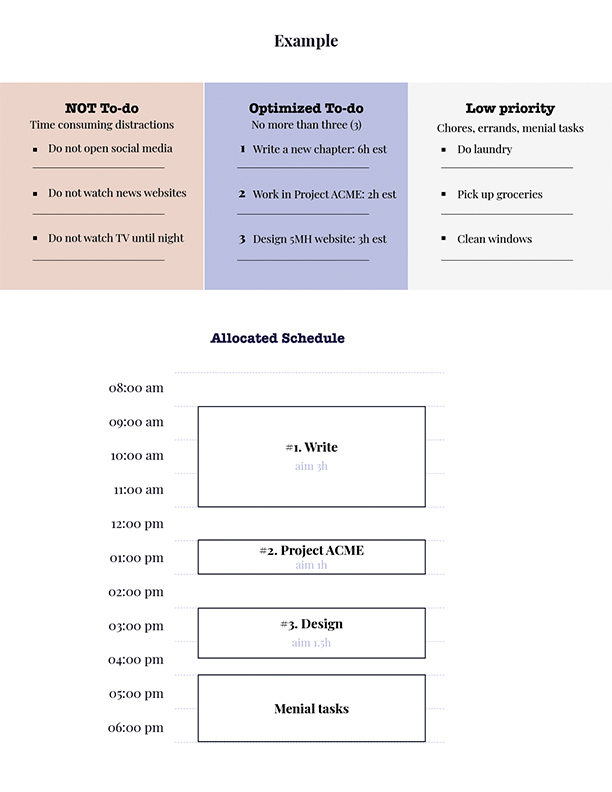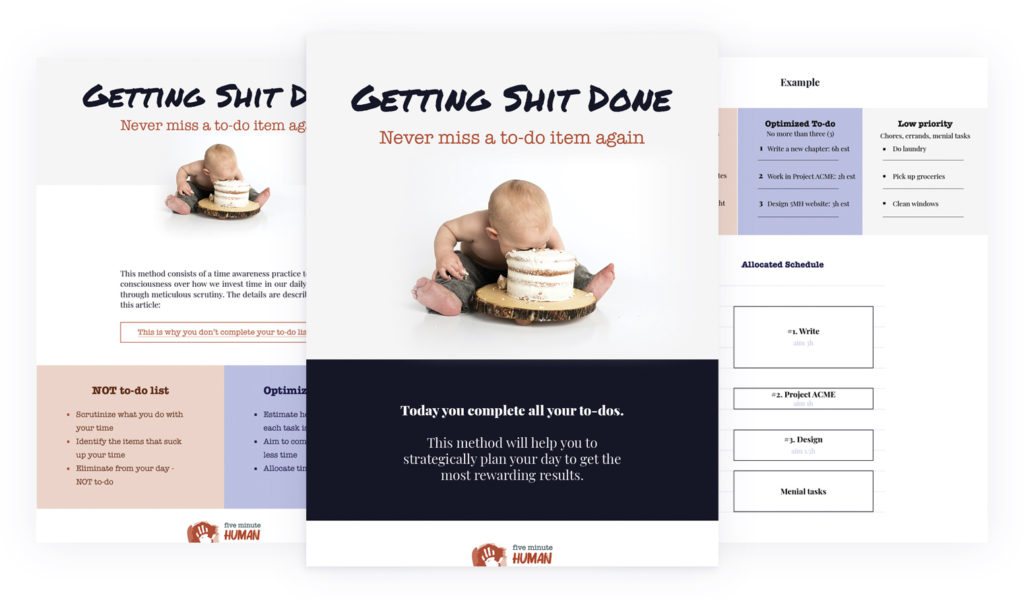By the end of this short read, you will have a new tool for getting tasks done. This is the day you stop missing a to-do item again.
Notwithstanding that we carefully plan our days, there are those days when we simply can’t tick all the items. In an awful day like this I would follow a link in my email, land on a strange website, then realise after wasting two hours of my production time I ended at a Wikipedia page reading about the flat earth conspiracy theory 🤷🏻♀️
Was this what I was supposed to do with my time? Why make an effort planning if I’m not going to tick all the items on my list? When we understand the underlying reasons for such phenomena, the problems become tangible. Then, we can condition our environment to make the proper adjustments.
Riding Distractions
To be honest, saying that there is only one reason for ineffectiveness would be a fallacy. It can certainly be manifold, namely, an overwhelming number of tasks, sluggishness, laziness, tiredness, lack of a plan, postponing, etc. However, I’d like to call out what I name the Four Horsemen of Unproductivity:
- Lack of motivation (purpose).
- Procrastination (distractions).
- Lack of acknowledgement (planning).
- Inaccurate behavior (execution).
For the sake of brevity, I will attack one of the strongest Horseman of Unproductivity: Mister Procrastination. Also known as the little monkey inside our brain who chases any distraction with free will, making us postpone our duties, despite knowing it can have dreadful consequences.
I’m aware that attacking the motivation problem would be the ideal root-cause situation to solve. It can be scary to open this Pandora’s box since it can unveil fear, discontentment, and paralysis, as seen in this plain stupid assessment that will shock your life. Nevertheless, being motivated or not, we simply need to get shit done. This is how you do it.
Creating a NOT to-do list
While we focus on what we should do on a given day, we take for granted that the wild monkey in our brains will behave properly. Procrastination Horseman likes us to naively think this way.
To tame that powerful creature we need intimate information. What does he like? What calls his attention the most? Where does he spend most of his time?
You probably catch my drift. Once you are aware of your mind’s distractions, you can act to condition your environment to avoid chaos. This will keep your focus on the things you need to do.
Scrutinize what you do with your time
Is it surprising that pooping takes either five minutes or thirty minutes based on whether you take your phone or not with you to the toilet? No. But do you ever scrutinize this activity in this way? Probably not.
Take one day to track every single activity you perform next to the time it takes. You will be surprised by the banalest things you do and how much time they take away from you.
This assessment is the most important thing you have to do. It creates time awareness. I will open my shyness vault to share with you some of my personal findings from a time when I did this experiment (I used toggl for this).
- Morning ritual: 56 min
- Breakfast: 24 min
- Reading: 108 min
- Pooping without phone: 8 min
- Workout: 78 min
- Personal messaging (WhatsApp, SMS): 35 min
- Email: 43 min
- Social media: 53 min
- Random internet surfing (procrastination): 85 min
- Work total: 223 min
Identify the items that suck up your time
In this activity, it’s key to identify the items that generate distraction. They feed your instant gratification system more frequently, making you addicted to them. Seeing your social media likes and comments, replying to messages to talk about what you are doing at the moment, interrupting your work to watch Youtube videos, you name it.
Think of the time you will gain – time at your disposal to be used for achieving your goals. In my example, if we do the maths with the elements that took most of the non-production time, the distractions of social media, internet surfing and all types of non work related messages were around three (3) hours of time invested in feeding the monkey.
Blindfold the jockey
Understand that a distraction is a focus assassin. When you are performing an activity, a distraction becomes a form of interruption. According to research, the time it will take you to get back in the zone (state of flow) is twenty five minutes on average. Once we realise we spent one hour watching Youtube videos it will take us at least another twenty five minutes to concentrate on whatever activity we were supposed to be doing.
The impact of distractions can be catastrophic. That is why we get stuck and think the day flew by us while we did nothing. No, we did a lot of time wasting instead, but we did nothing of what we were supposed to do.
Now that we identified the source of our distractions, what do we do? My advice is to condition your environment in a way so we don’t feed the procrastination horseman. Eliminate those activities from your day, number them and create the NOT to-do list. For example:
- Do not open social media after 8PM.
- Do not watch news websites.
- Do not take my phone to the toilet.
For more practical effects, you must take this further. Eliminate the elements that create the distraction. For example, similar to one of the remedies to leave bed early, I turn off my phone while I work.
Drastic changes require drastic measures, or simply awareness of the time we have been wasting.
It’s not always that we need to do more but rather that we need to focus on less
Nathan W. Morris, author and finance expert
Creating an optimized to-do list
Obviously, we still need a list of the things we need to do, however, we’ll add productivity steroids to it by injecting priority and some antidote to Parkison’s Law.
Estimate how much time each task is going to take
According to Parkinson’s Law “work expands so as to fill the time available for its completion”.
If we are asked to write a graduation thesis, we have six months to complete it. Surveys show that students can actually write the thesis in less than one week. However, given the fact that the time is so vast, we tend to associate the task as difficult, when in reality we just need one week instead of six months. Yet, we don’t finish it in the first week, but the last one of the given time.
As a recommendation, every time you face a task, estimate how much time you need to complete it. Then, aim to complete it in 50% less time than what you estimated.
- Write a new chapter of my novel: estimate 6h – aim 3h
- Work in Project ACME: estimate 2h – aim 1h
- Design 5MH website: estimate 3h – aim 1.5h
Allocate time
When we create a to-do list, we typically point out the items. To make it more efficient, we must also allocate the time when we plan to do them. What is the best time of the day for you to perform work or the activities you plan to execute? What works the best in terms of priority? That’s a personal preference.
The key is not to prioritize what’s on your schedule, but to schedule your priorities
Stephen Covey, American educator, author and businessman
It is critical to create awareness and commitment by allocating the time of day for each task. This gives you clarity, it draws the big picture of what, when and how you are going to get shit done. No questions, no doubts, just do!
Putting all together, it should look like this.
- [9:00 AM – 12:00 PM] Write a new chapter of my novel: 3h
- [1:00 PM – 2:00 PM] Work in Project ACME: 1h
- [3:00 PM – 4:30 PM] Design 5MH website: 1.5h

The Ultimate Daily To-Do List Template
Aha, we’ve arrived at the moment of truth, the juice of this article. With this template you can plan every day like a champ by identifying your to-do and NOT to-do items, as well as allocating times with their due estimates.
Best of luck on this journey of making your productivity a procrastination-proof virtue. Enjoy.
Receive a free copy of the ultimate guide to plan your day to never miss an item out of your to-do list by joining the Human Club.


